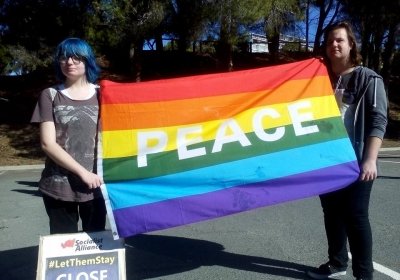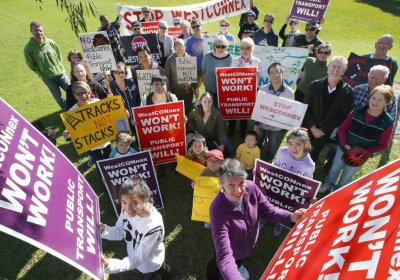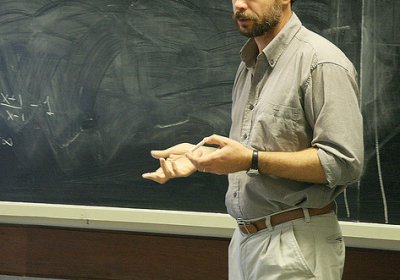Hillary Clinton and Donald Trump reacted to the June 12 Orlando shootings, in which 50 people were shot dead at the Flordia gay club Pulse, with evidence that they can agree on at least one thing: bombing people. Both presidential candidates called for an escalation of the US-led bombing campaign against ISIS in Syria and Iraq.
“We have generals that feel we can win this thing so fast and so strong, but we have to be furious for a short period of time, and we’re not doing it!” Trump complained on Fox & Friends on June 13.
1098
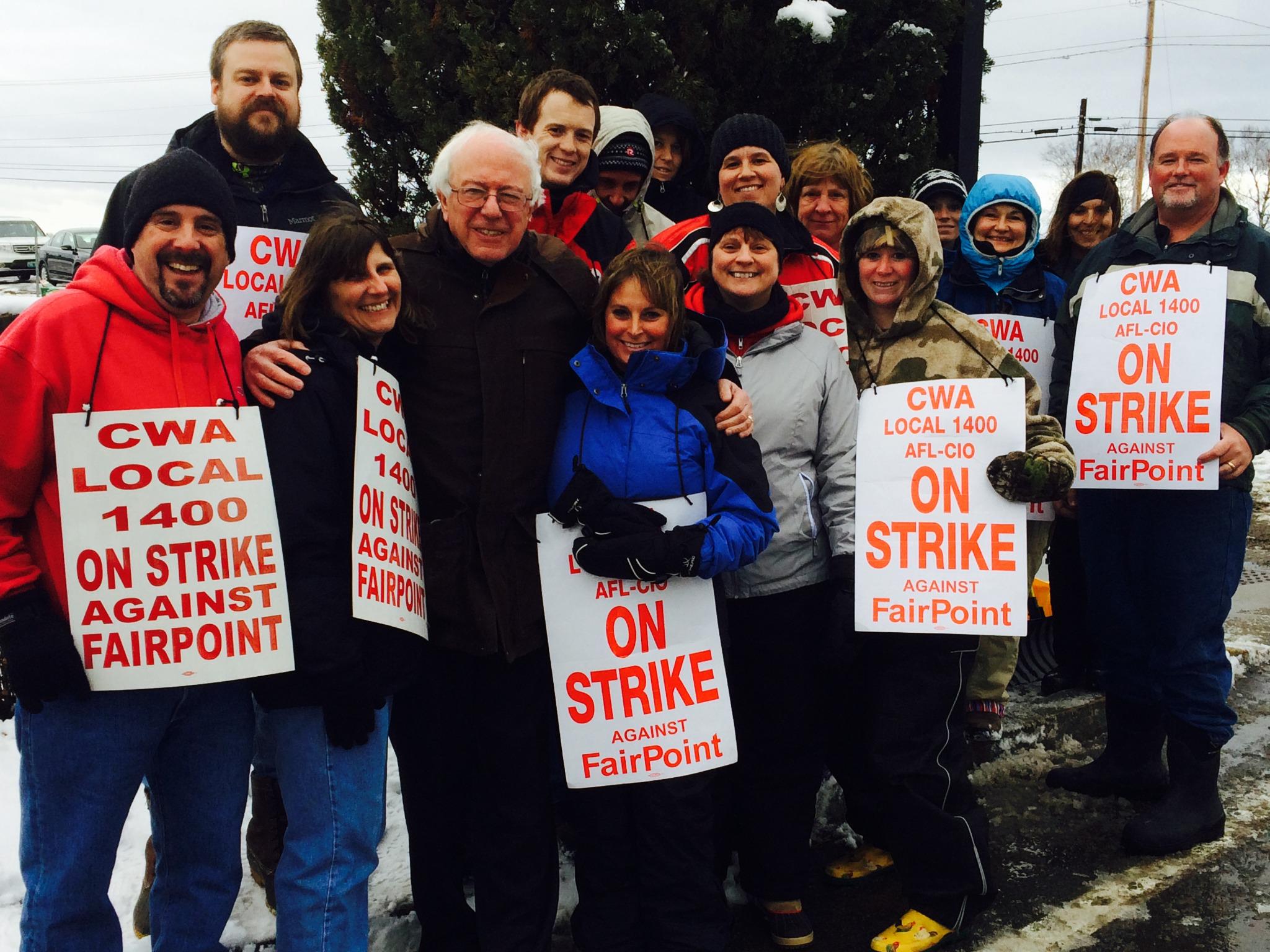 Bernie Sanders joins striking FairPoint workers on the picket line in South Burlington, Vermont, January 18.
For a year now, presidential candidate Bernie Sanders has been the hope of millions in the United States. He has been the hope of people disgusted with the role of the banks and corporations in politics, angered by growing inequality, appalled by racial injustice and opposed to a foreign policy based on military intervention.
Bernie Sanders joins striking FairPoint workers on the picket line in South Burlington, Vermont, January 18.
For a year now, presidential candidate Bernie Sanders has been the hope of millions in the United States. He has been the hope of people disgusted with the role of the banks and corporations in politics, angered by growing inequality, appalled by racial injustice and opposed to a foreign policy based on military intervention.
“Oil didn’t wreck Venezuela’s economy, socialism did.” That’s what Pascal-Emmanuel Gobry, of the Washington-based conservative think tank Ethics and Public Policy Center, wrote earlier this year in his reflection on Venezuela’s deepening economic crisis.
Gobry, a prolific writer for Forbes and the Wall Street Journal, criticised Venezuelan analysts who scapegoat oil, even though he recognised that declining oil prices have aggravated the nation’s difficulties.
“The culprit is clear and obvious,” Golbry contends. “The problem is Venezuela's authoritarian socialism.”
There's a war going on — the class war. Funnily enough, the only time you hear politicians using that term is as an epithet, not as a descriptor for the daily life of the overwhelming majority of society.
An example: Prime Minister Malcolm Turnbull accused Labor leader Bill Shorten of declaring war on business and waging a “class war” for making the modest suggestion that the rich should pay a fairer share of tax.
 The latest in a series of legal challenges to the opening of the Galilee Basin to new coal mines began in the Queensland Court of Appeal on June 7.
In a one-day session, Queensland's highest court heard arguments on behalf of local environment group Coast and Country Association of Queensland against GVK Hancock's proposed Alpha coalmine in the Galilee Basin.
The latest in a series of legal challenges to the opening of the Galilee Basin to new coal mines began in the Queensland Court of Appeal on June 7.
In a one-day session, Queensland's highest court heard arguments on behalf of local environment group Coast and Country Association of Queensland against GVK Hancock's proposed Alpha coalmine in the Galilee Basin.
 About 50 people attended an action in solidarity with students in Papua New Guinea outside the PNG Consulate on June 10. On June 8, PNG police shot at protesting students at the University of Port Moresby.
Sydney-based Papua New Guineans were joined by students, academics, unionists and NGOs to call for an immediate stop to the repression and for the students' demands to be met.
About 50 people attended an action in solidarity with students in Papua New Guinea outside the PNG Consulate on June 10. On June 8, PNG police shot at protesting students at the University of Port Moresby.
Sydney-based Papua New Guineans were joined by students, academics, unionists and NGOs to call for an immediate stop to the repression and for the students' demands to be met.
Protesters gathered outside the Four Seasons Hotel on June 15 to oppose the controversial WestConnex private tollway, which is being forced through by the Coalition state government at a massive cost to New South Wales taxpayers. The hotel was the site of an Infrastructure Conference, addressed by Premier Mike Baird, federal Labor opposition infrastructure spokesperson Anthony Albanese and other political and urban development leaders.
 About 20 protesters demonstrated in front of the Melbourne Department of Immigration and Border Protection (DIBP) on June 6 over allegations of asylum seeker mistreatment. Police presence was described by observers as extremely heavy, ranging from two dozen to fifty officers.
About 20 protesters demonstrated in front of the Melbourne Department of Immigration and Border Protection (DIBP) on June 6 over allegations of asylum seeker mistreatment. Police presence was described by observers as extremely heavy, ranging from two dozen to fifty officers.
 About 20 protesters demonstrated in front of the Melbourne Department of Immigration and Border Protection (DIBP) on June 6 over allegations of asylum seeker mistreatment. Police presence was described by observers as extremely heavy, ranging from two dozen to fifty officers.
About 20 protesters demonstrated in front of the Melbourne Department of Immigration and Border Protection (DIBP) on June 6 over allegations of asylum seeker mistreatment. Police presence was described by observers as extremely heavy, ranging from two dozen to fifty officers.
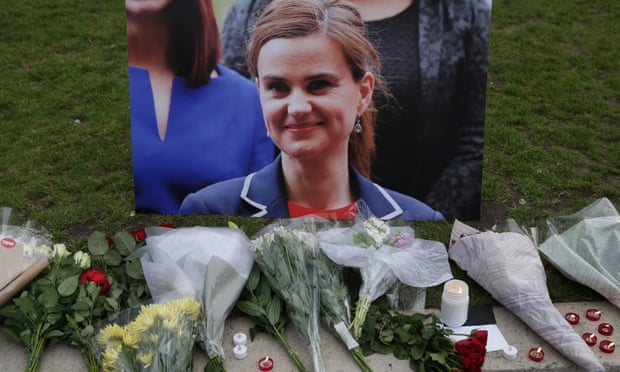 British Labour MP Jo Cox, who was murdered by an apparent fascist on June 16, was a strong advocate for refugee rights.
Several non-profit groups that used to work closely with her and the refugees for whom she advocated immediately expressed their sorrow and praised her commitment to human dignity in Britain and abroad.
British Labour MP Jo Cox, who was murdered by an apparent fascist on June 16, was a strong advocate for refugee rights.
Several non-profit groups that used to work closely with her and the refugees for whom she advocated immediately expressed their sorrow and praised her commitment to human dignity in Britain and abroad.
 About 20 protesters demonstrated in front of the Melbourne Department of Immigration and Border Protection (DIBP) on June 6 over allegations of asylum seeker mistreatment. Police presence was described by observers as extremely heavy, ranging from two dozen to fifty officers.
About 20 protesters demonstrated in front of the Melbourne Department of Immigration and Border Protection (DIBP) on June 6 over allegations of asylum seeker mistreatment. Police presence was described by observers as extremely heavy, ranging from two dozen to fifty officers.
Teaching is one of the lowest-paid professions and casual relief teachers (CRTs) are among the most marginalised and exploited workers in Victoria.
Our daily pay rate is $293. Think that sounds good? Well, there are about 200 teaching days a year. If we were to work every one of those days, we would still earn less than $60,000 a year — that is the maximum pay we can expect, after a minimum of four years at university.
But we are emergency teachers; we can expect to work, at most, about 100 days. That is less than $30,000 a year.
- Previous page
- Page 2
- Next page
